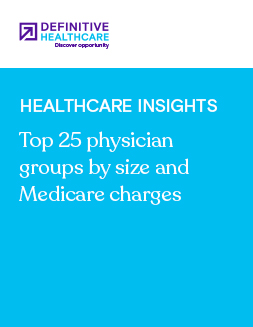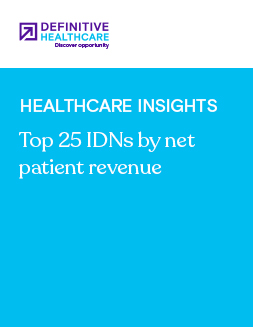Healthcare Insights
Largest revenue cycle management (RCM) vendors
RCM healthcare services are essential to the success of any hospital or healthcare organization. Simply put, a robust revenue cycle management solution ensures financial viability, allowing providers to focus on delivering quality patient care while administrative and financial tasks are handled by other personnel or software.
Because the healthcare revenue cycle can be very complex, many healthcare organizations rely on RCM software to properly manage every step of the medical billing process.
What is revenue cycle management?
Revenue cycle management is exactly what it sounds like—a strategy that healthcare organizations can use to manage the administrative and clinical processes in their revenue cycle. This involves processing claims, collecting patient payments, communicating with health insurance payors, and more.
What is a revenue cycle management company?
While the revenue cycle management process can be done manually, the complexity of the steps involved in the cycle means that there are many opportunities for costly errors to occur. In-house RCM teams can also be an expensive investment, as the healthcare company must hire and train staff, purchase software, and manage operations.
That’s where a revenue cycle management company can come in and help. RCM vendors offer external support and software so healthcare providers can track their financials and stay organized—potentially at a lower price and with no mistakes.
RCM software automates the process and can help healthcare organizations properly navigate their revenue cycle, identify errors or leakage points, and ensure the facility is fairly paid for the services they provide.
What are the steps of the revenue cycle in healthcare?
The revenue cycle comprises seven steps:
- Collect patient info: The cycle begins when a patient makes an appointment with a healthcare provider and provides personal information. This includes home address, date of birth, insurance info, phone number, and other details.
- Charge capture: At this point, details about the services rendered are sent to billing.
- Coding: CPT codes are assigned to diagnoses and medical services that insurance providers can refer to for reimbursement.
- Claim submission: Once a charge is captured and coded, the claim gets sent to the insurance provider.
- Insurance review: At this stage, the healthcare organization and the insurance provider may follow up on what has and hasn’t been paid.
- Billing and collection: Once the claim has been verified and processed, it will become the patient’s responsibility to cover some of the service costs. Generally, these costs are determined during the first appointment so the facility can receive payment sooner rather than later.
- Revenue cycle review: RCM software can make the most impact at this final stage of the cycle. Now that everything has been paid for, it’s time to review how the process went. What were the stumbling blocks? Is there any way to tweak the process to make it smoother for patients? This is where the organization can look at inefficiencies in the process and make improvements.
Below, we rank the most popular revenue cycle management software based on the number of installations in hospitals.
| Rank | Vendor | # of installs | % market share | Explore dataset |
|---|---|---|---|---|
| 1 | Epic Systems Corporation | 3,456 | 48.6% | Explore |
| 2 | Oracle Cerner | 1,880 | 26.4% | Explore |
| 3 | MEDITECH | 1,323 | 18.6% | Explore |
| 4 | SSI Group | 931 | 13.1% | Explore |
| 5 | Experian Health | 630 | 8.9% | Explore |
| 6 | TruBridge | 612 | 8.6% | Explore |
| 7 | MEDHOST | 568 | 8.0% | Explore |
| 8 | Optum | 536 | 7.5% | Explore |
| 9 | Veradigm Inc | 512 | 7.2% | Explore |
| 10 | Proprietary Software | 508 | 7.1% | Explore |
Fig. 1 Data from Definitive Healthcare’s HospitalView product. Data accessed November 2025.
Which RCM vendor had the highest install volume?
Epic Systems Corporation has a clear lead over the other vendors we track and analyze using HospitalView. Epic’s RCM software has 3,456 installations and a market share of 48.6%. The second most popular RCM software is Oracle Cerner with 1,880 installations and a market share of 26.4%. MEDITECH is in third place with 1,323 installations and a market share of 18.6%.
These results aren’t too surprising, as Epic is also one of the biggest providers of electronic health record systems in the U.S. It’s common to find RCM services bundled with EHR systems or medical practice management platforms, as it’s a way of better handling patient engagement and ensuring claims remain organized, accurate and easily accessible.
What is the overall goal of RCM management services?
While the overall goal of revenue cycle management is to maximize a healthcare facility’s profits, patients can also benefit from a well-designed RCM process.
Part of a successful RCM strategy means making improvements to communication between the healthcare provider and the patient. Perspectives in the healthcare industry are shifting and now price transparency is more important than ever. A facility can take strides to retain patients and build stronger relationships by letting patients know of expenses ahead of time. This way, there won’t be any unexpected surprises, and patients can make financial arrangements or request assistance as necessary.
How can RCM vendor intelligence help your commercialization strategy?
No matter where you are within the care continuum, data on RCM vendors can offer your organization valuable insights that can improve your commercialization strategy and make more informed decisions regarding pricing, staffing, and other strategic choices.
For example, a large health system could use this healthcare commercial intelligence to find the most suitable RCM vendor for its financial needs. As a result, the health system could remain compliant with evolving industry standards and regulations, automate time-consuming processes, and potentially save money that would have been spent on training and supplies.
Alternatively, a small practice management software vendor could use healthcare commercial intelligence on RCM providers to identify potential customers within its territory already using RCM software from other companies. This info could help the vendor develop a targeted marketing campaign that focuses on the benefits of its software over the competition.
Learn more
Healthcare Insights are developed with healthcare data and analytics from the Definitive Healthcare platform. Want even more insights? Start a free trial now and get access to the latest info on hospitals, physicians, and other healthcare providers.


